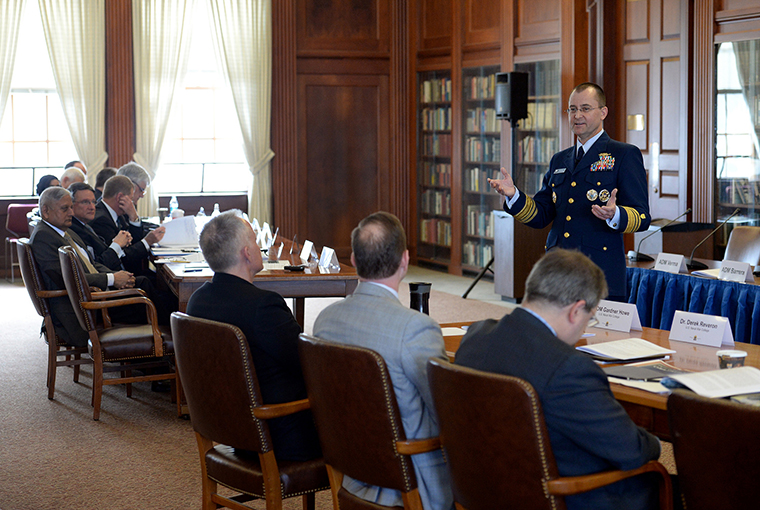EMC Chair Symposium: Maritime Strategy

About this Event
Event Information
U.S. Naval War College
This event is not open to the general public
${isOpenDescription}This third maritime-centric EMC Chair symposium is a follow-up to the release of the 2015 Cooperative Strategy for 21st century Seapower. The symposium will explore maritime strategy, concepts essential to implement the maritime strategy, and international reactions to it. Participants from DOD, academia, and the policy community will convene in Newport to discuss maritime issues. The implications are important for understanding the types of missions combatant commanders will execute and the types of equipment and training the sea services must provide to support these missions.
Keynotes:
VADM Charles D. Michel, Vice Commandant of the U.S. Coast Guard
David E. Sanger, New York Times
Research Addresses:
Thomas Hughes, School of Advanced Air and Space Studies, "Admiral Bill Halsey and the Unanticipated Strategy: The South Pacific in World War II"
Carol Atkinson, University of Southern California, "Military Soft Power"
Sally C. Paine, U.S. Naval War College, "Wars for Asia"
Panel 1: International Perspectives on Maritime Strategy
The 2007 maritime strategy and its 2015 update stress the importance of partnering with navies around the world to provide maritime security. The 2015 revision of a "Cooperative Strategy for 21st Century Seapower" devotes an entire section to international partnerships because “By expanding our network of allies and partners and improving our ability to operate alongside them, naval forces: foster the secure environment essential to an open economic system based on the free flow of goods, protect US natural resources, promote stability, deter conflict, and respond to aggression.”
Panel 2: Reflections on Maritime Strategy
The panel will review how the U.S. Navy, Marine Corps, and Coast Guard "refreshed" the 2007 Cooperative Strategy for 21st Century Seapower to keep pace with changing times.
Panel 3: Navy Force Development
The 2015 maritime strategy calls for the Navy to possess a wide ranging set of capabilities including: all domain access, deterrence, sea control and power projection, and maritime security. Along with these capabilities, the updated strategy brings forward several concepts, which if implemented successfully, will enable the Navy to leverage partnerships with other services and countries, better prepare its people to implement the strategy in the future, and develop needed capabilities in the “electromagnetic-cyber” environment.
Panel 4: New Perspectives on Maritime Strategy
This panel will offer perspectives from young scholars to illustrate how strategic theory interacts with the 21st century’s challenges. Serving as a bridge between today’s strategy documents and the future, these scholars will offer new perspectives on maritime strategy.
Panel 5: Maritime Warfare
"A Cooperative Strategy for 21st Century Seapower" declares that "the Sea Services operate in the world’s oceans to protect the homeland, build security globally, project power, and win decisively. This ability to maneuver globally on the seas and to prevent others from using the sea against our interests constitutes a strategic advantage for the United States." Yet the ability to maneuver is increasingly challenged as adversaries employ anti-access/area-denial concepts and weapons against the US and its partners. Consequently, new concepts are needed to employ naval forces in denied areas.
Panel 6: Humanitarian Assistance and Disaster Relief
Humanitarian organizations, international agencies, and militaries increasingly find themselves faced with complex emergencies and natural disasters in urban settings. Future climate change projections place coastal mega-cities at even greater risk than they are today.
Most Recent
8:00 a.m.
U.S. Naval War College, 686 Cushing Rd, Newport, RI 02841
U.S. Naval War College, 686 Cushing Road, Newport, RI 02841
U.S. Naval War College, 686 Cushing Road, Newport, RI 02841
8:00 a.m.
U.S. Naval War College, 686 Cushing Road, Newport, RI 02841
U.S. Naval War College, 686 Cushing Rd, Newport, RI 02841
